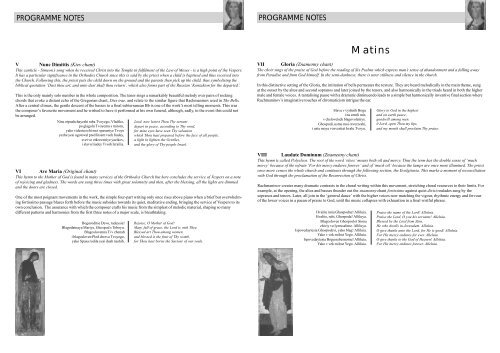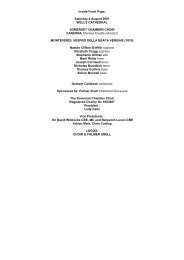to view the concert programme - Somerset Chamber Choir
to view the concert programme - Somerset Chamber Choir
to view the concert programme - Somerset Chamber Choir
You also want an ePaper? Increase the reach of your titles
YUMPU automatically turns print PDFs into web optimized ePapers that Google loves.
PROGRAMME NOTES PROGRAMME NOTES<br />
V Nunc Dimittis (Kiev chant)<br />
This canticle - Simeon’s song when he received Christ in<strong>to</strong> <strong>the</strong> Temple in fulfilment of <strong>the</strong> Law of Moses - is a high point of <strong>the</strong> Vespers.<br />
It has a particular significance in <strong>the</strong> Orthodox Church since this is said by <strong>the</strong> priest when a child is baptised and thus received in<strong>to</strong><br />
<strong>the</strong> Church. Following this, <strong>the</strong> priest puts <strong>the</strong> child down on <strong>the</strong> ground and <strong>the</strong> parents <strong>the</strong>n pick up <strong>the</strong> child, thus symbolising <strong>the</strong><br />
biblical quotation ‘Dust thou art, and un<strong>to</strong> dust shalt thou return’, which also forms part of <strong>the</strong> Russian ‘Kontakion for <strong>the</strong> departed’.<br />
This is <strong>the</strong> only mainly solo number in <strong>the</strong> whole composition. The tenor sings a remarkably beautiful melody over pairs of rocking<br />
chords that evoke a distant echo of <strong>the</strong> Gregorian chant, Dies irae, and relate <strong>to</strong> <strong>the</strong> similar figure that Rachmaninov used in The Bells.<br />
After a central climax, <strong>the</strong> gentle descent of <strong>the</strong> basses <strong>to</strong> a final subterranean Bb is one of <strong>the</strong> work’s most telling moments. This was<br />
<strong>the</strong> composer’s favourite movement and he wished <strong>to</strong> have it performed at his own funeral, although, sadly, in <strong>the</strong> event this could not<br />
be arranged.<br />
Nine otpushchayeshi raba Tvoyego, Vladiko,<br />
po glagolu Tvoyemu s mirom,<br />
yako videsta ochi moi spaseniye Tvoye<br />
yezhe yesi ugo<strong>to</strong>val pred litsem vseh Iiudey,<br />
svet vo otkroveniye yazikov,<br />
i slavu Iiudey Tvoih Izrailia.<br />
VI Ave Maria (Original chant)<br />
This hymn <strong>to</strong> <strong>the</strong> Mo<strong>the</strong>r of God is found in many services of <strong>the</strong> Orthodox Church but here concludes <strong>the</strong> service of Vespers on a note<br />
of rejoicing and gladness. The words are sung three times with great solemnity and <strong>the</strong>n, after <strong>the</strong> blessing, all <strong>the</strong> lights are dimmed<br />
and <strong>the</strong> doors are closed.<br />
One of <strong>the</strong> most poignant movements in <strong>the</strong> work, <strong>the</strong> simple four-part writing only once rises above piano when a brief but overwhelming<br />
fortissimo passage blazes forth before <strong>the</strong> music subsides <strong>to</strong>wards its quiet, meditative ending, bringing <strong>the</strong> service of Vespers <strong>to</strong> its<br />
own conclusion. The assurance with which <strong>the</strong> composer crafts his music from <strong>the</strong> simplest of melodic material, shaping so many<br />
different patterns and harmonies from <strong>the</strong> first three notes of a major scale, is breathtaking.<br />
Bogoroditse Devo, raduysia!<br />
Blagodatnaya Mariye, Ghospod s Toboyu.<br />
Blagoslovenna Ti v zhenah<br />
i blagosloven Plod chreva Tvoyego,<br />
yako Spasa rodila yesi dush nashih.<br />
Lord, now lettest Thou Thy servant<br />
depart in peace, according <strong>to</strong> Thy word,<br />
for mine eyes have seen Thy salvation<br />
which Thou hast prepared before <strong>the</strong> face of all people,<br />
a light <strong>to</strong> lighten <strong>the</strong> Gcntiles,<br />
and <strong>the</strong> glory of Thy people Israel.<br />
Rejoice, O Mo<strong>the</strong>r of God!<br />
Mary, full of grace, <strong>the</strong> Lord is with Thee.<br />
Blessed art Thou among women<br />
and blessed is <strong>the</strong> fruit of Thy womb,<br />
for Thou hast borne <strong>the</strong> Saviour of our souls.<br />
Matins<br />
VII Gloria (Znamenny chant)<br />
The choir sings of <strong>the</strong> praise of God before <strong>the</strong> reading of Six Psalms which express man’s sense of abandonment and a falling away<br />
from Paradise and from God himself. In <strong>the</strong> semi-darkness, <strong>the</strong>re is utter stillness and silence in <strong>the</strong> church.<br />
In this distinctive setting of <strong>the</strong> Gloria, <strong>the</strong> imitation of bells permeates <strong>the</strong> texture. They are heard melodically in <strong>the</strong> main <strong>the</strong>me, sung<br />
at <strong>the</strong> outset by <strong>the</strong> al<strong>to</strong>s and second sopranos and later joined by <strong>the</strong> tenors, and also harmonically in <strong>the</strong> triads heard in both <strong>the</strong> higher<br />
male and female voices. A tantalising pause with a dramatic diminuendo leads <strong>to</strong> a simple but harmonically inventive final section where<br />
Rachmaninov’s imaginative <strong>to</strong>uches of chromaticism intrigue <strong>the</strong> ear.<br />
Slava v vyshnih Bogu<br />
i na zemli mir,<br />
v chelovetseh blagovoleniye.<br />
Ghospodi, ustne moi otverzeshi,<br />
i usta moya vozvestiat hvalu Tvoyu.<br />
Glory <strong>to</strong> God in <strong>the</strong> highest<br />
and on earth peace,<br />
goodwill among men.<br />
0 Lord, open Thou my lips,<br />
and my mouth shall proclaim Thy praise.<br />
VIII Laudate Dominum (Znamenny chant)<br />
This hymn is called Polyeleos. The root of <strong>the</strong> word ‘eleos’ means both oil and mercy. Thus <strong>the</strong> term has <strong>the</strong> double sense of ‘much<br />
mercy’ because of <strong>the</strong> refrain ‘For his mercy endures forever’ and of ‘much oil’ because <strong>the</strong> lamps are once more illumined. The priest<br />
once more censes <strong>the</strong> whole church and continues through <strong>the</strong> following section, <strong>the</strong> Evolgitaria. This marks a moment of reconciliation<br />
with God through <strong>the</strong> proclamation of <strong>the</strong> Resurrection of Christ.<br />
Rachmaninov creates many dramatic contrasts in <strong>the</strong> choral writing within this movement, stretching choral resources <strong>to</strong> <strong>the</strong>ir limits. For<br />
example, at <strong>the</strong> opening, <strong>the</strong> al<strong>to</strong>s and basses thunder out <strong>the</strong> znamenny chant fortissimo against quiet divisi roulades sung by <strong>the</strong><br />
sopranos and tenors. Later, all join in <strong>the</strong> ‘general dance’ with <strong>the</strong> higher voices now matching <strong>the</strong> vigour, rhythmic energy and fervour<br />
of <strong>the</strong> lower voices in a paean of praise <strong>to</strong> God, until <strong>the</strong> music collapses with exhaustion in a final wistful phrase.<br />
Hvalite imia Ghospodne! Alliluia.<br />
Hvalite, rabi, Ghospoda! Alliluya.<br />
Blagosloven Ghospod ot Siona<br />
zhiviy vo Iyerusalime. Alliluya.<br />
Ispovedaytesia Ghospodevi, yako blag! Alliluia.<br />
Yako v vek milost Yego. Alliluia.<br />
Ispovedaytesia Bogu nebesnomu! Alliluia.<br />
Yako v vek milost Yego. Alliluia.<br />
Praise <strong>the</strong> name of <strong>the</strong> Lord! Alleluia.<br />
Praise <strong>the</strong> Lord, O you his servants! Alleluia.<br />
Blessed be <strong>the</strong> Lord from Zion,<br />
He who dwells in Jerusalem. Alleluia.<br />
O give thanks un<strong>to</strong> <strong>the</strong> Lord, for He is good! Alleluia.<br />
For His mercy endures for ever. Alleluia.<br />
O give thanks <strong>to</strong> <strong>the</strong> God of Heaven! Alleluia.<br />
For His mercy endures forever. Alleluia.












